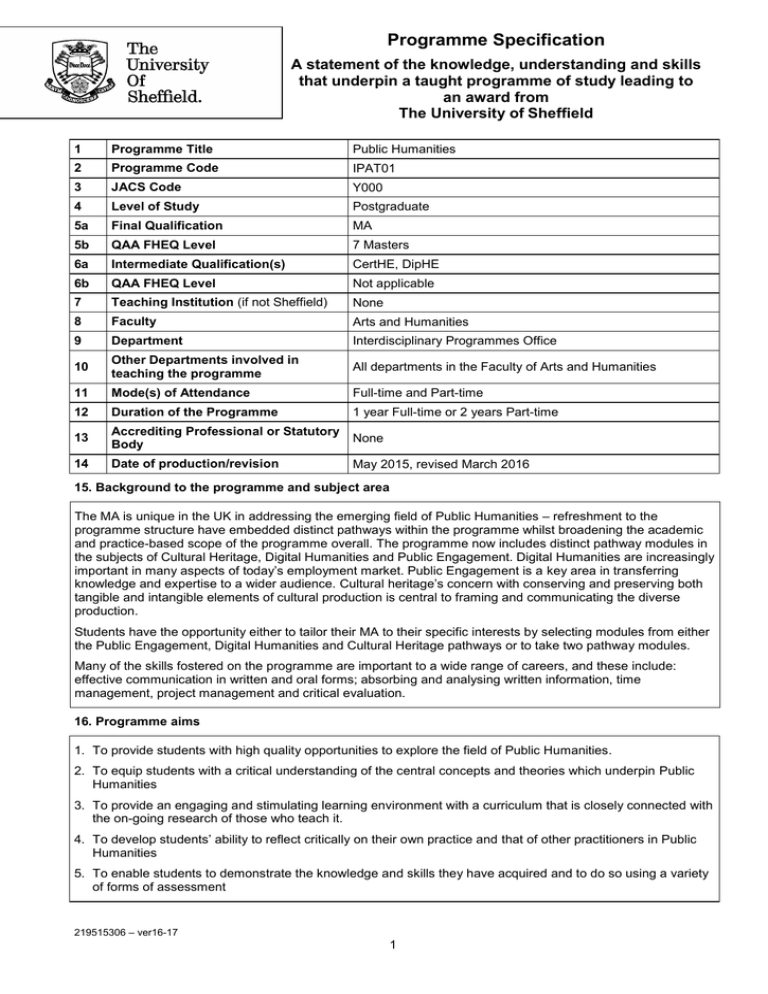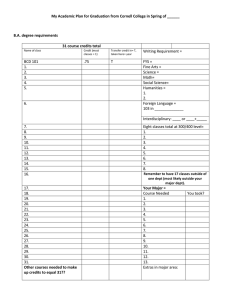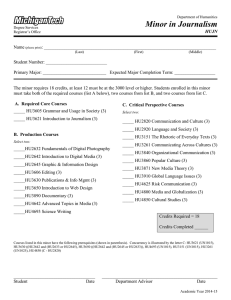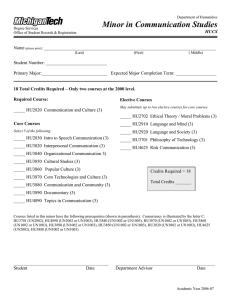Programme Specification
advertisement

Programme Specification A statement of the knowledge, understanding and skills that underpin a taught programme of study leading to an award from The University of Sheffield 1 Programme Title Public Humanities 2 Programme Code IPAT01 3 JACS Code Y000 4 Level of Study Postgraduate 5a Final Qualification MA 5b QAA FHEQ Level 7 Masters 6a Intermediate Qualification(s) CertHE, DipHE 6b QAA FHEQ Level Not applicable 7 Teaching Institution (if not Sheffield) None 8 Faculty Arts and Humanities 9 Department Interdisciplinary Programmes Office 10 Other Departments involved in teaching the programme All departments in the Faculty of Arts and Humanities 11 Mode(s) of Attendance Full-time and Part-time 12 Duration of the Programme 1 year Full-time or 2 years Part-time 13 Accrediting Professional or Statutory Body None 14 Date of production/revision May 2015, revised March 2016 15. Background to the programme and subject area The MA is unique in the UK in addressing the emerging field of Public Humanities – refreshment to the programme structure have embedded distinct pathways within the programme whilst broadening the academic and practice-based scope of the programme overall. The programme now includes distinct pathway modules in the subjects of Cultural Heritage, Digital Humanities and Public Engagement. Digital Humanities are increasingly important in many aspects of today’s employment market. Public Engagement is a key area in transferring knowledge and expertise to a wider audience. Cultural heritage’s concern with conserving and preserving both tangible and intangible elements of cultural production is central to framing and communicating the diverse production. Students have the opportunity either to tailor their MA to their specific interests by selecting modules from either the Public Engagement, Digital Humanities and Cultural Heritage pathways or to take two pathway modules. Many of the skills fostered on the programme are important to a wide range of careers, and these include: effective communication in written and oral forms; absorbing and analysing written information, time management, project management and critical evaluation. 16. Programme aims 1. To provide students with high quality opportunities to explore the field of Public Humanities. 2. To equip students with a critical understanding of the central concepts and theories which underpin Public Humanities 3. To provide an engaging and stimulating learning environment with a curriculum that is closely connected with the on-going research of those who teach it. 4. To develop students’ ability to reflect critically on their own practice and that of other practitioners in Public Humanities 5. To enable students to demonstrate the knowledge and skills they have acquired and to do so using a variety of forms of assessment 219515306 – ver16-17 1 6. To provide students with the opportunity to apply the skills they have acquired. 17. Programme learning outcomes Knowledge and understanding: K1 Critical understanding of key concepts which underpin Public Humanities. K2 A critical awareness of the development of key theoretical concepts about Public Engagement, Digital Humanities and Cultural Heritage. K3 Develop transferable skills in communication and project management. K4 Practical experience of emerging digital technologies. K5 Knowledge and practical experience of public engagement and cultural heritage and their role in the wider social context. Skills and other attributes: S1 The ability to identify appropriate and challenging questions, discuss these in seminars with peers and members of academic staff, and address them in sustained pieces of academic writing. S2 The ability to undertake appropriately informed and contextualised practical responses to key issues of digital humanities or public engagement or cultural heritage. S3 The ability to engage and interact with others, by presenting aspects of the work orally to an audience, responding appropriately to feedback and questions. S4 Project work - the ability to apply a variety of informed practices appropriately and productively. S5 Application of digital technology, public engagement and cultural heritage skills in an appropriate context. 18. Teaching, learning and assessment Development of the learning outcomes is promoted through the following teaching and learning methods: 1. Seminars and workshops Seminars and workshops provide an opportunity for students to consolidate and reflect upon their understanding of information gained either through guided reading and independent research. New information and examples may also be presented by tutors or located by the students themselves for examination and discussion in the seminar. In-depth exploration of a range of concepts and materials is facilitated through a process of questioning and open discussion. This process may be either tutor- or student-led. Students have the opportunity to practise skills of analysis and evaluation in the small group discussion. In some modules, technological skills are developed through practical experience of digital humanities .(S1-3, K1,2, 5). 2. Project work Students will undertake a project module in which they are supported in work with an external partner on a project in digital humanities, public engagement / cultural heritage. Project work includes key elements of project management, communication strategies to diverse audiences, critical evaluation and reflection (S2-5, K3-5). 3. Individual consultation During the spring semester students will have scheduled one-to-one meetings with their allocated dissertation supervisor to discuss scope, key questions and project elements of the dissertation (S1-3, K1-3.) 4. Independent study Independent study is a key element of the MA in Public Humanities. It includes preparatory reading for seminar tasks and practical exercises, background reading for assessments, the expansion of knowledge gained through seminars, preparation for presentations. Independent study is also an important mode for reinforcing and developing student’s independence and self-direction (S1-3, K 1-3). 219515306 – ver16-17 2 Opportunities to demonstrate achievement of the learning outcomes are provided through the following assessment methods: Written assessment Most modules of the programme require some form of written assessment, although this takes a variety of forms. These are used to assess students’ knowledge and understanding of particular key elements. Forms undertaken include project reports, short essays, critical evaluation and dissertation. Oral presentations Some modules may require students to present seminar tasks or independent research orally – these may be group presentations or individual presentations. The broader opportunities include the development of qualities of personal organisation and time-management as students have responsibility in directing their own learning. 19. Reference points The learning outcomes have been developed to reflect the following points of reference: Understanding and practical knowledge of key issues and practice of Digital Humanities, Public Engagement and Cultural Heritage. Learning and Teaching Strategy (2011-16) University Strategic Plan http://www.sheffield.ac.uk/strategicplan Learning and Teaching Strategy (2011-16) http://www.shef.ac.uk/lets/strategy/lts11_16 20. Programme structure and regulations Full Time A candidate shall take 1. IPA600 F7 Introduction to Public Humanities, 15 credits IPA630 F7 Public Humanities Dissertation, 60 credits 2) 30 credits from 2Ai) For the Public Engagement Pathway a candidate shall take IPA620 F7 Understanding Public Engagement, 15 credits IPA635 F7 Advanced Public Engagement, 15 credits 2Aii) For the Digital Humanities Pathway a candidate shall take: IPA610 F7 Introduction to Digital Humanities, 15 credits IPA615 F7 Advanced Digital Humanities, 15 credits 2Aiii) For the Cultural Heritage Pathway a candidate shall take: AAP6102 F7 Heritage, History and Identity 15 credits AAP637 F7 Heritage, Place and Community, 15 credits 3) 30 credits from IPA625 F7 Public Engagement in Practice, 30 credits IPA640 F7 Digital Humanities in Practice 30 credits 4.. units to the value of forty five credits F7 Level units to the value of not more than forty five credits 219515306 – ver16-17 3 Part Time Year 1 A candidate shall take 1. IPA600 F7 Introduction to Public Humanities, 15 credits 30 credits from 2Ai) For the Public Engagement pathway a candidate shall take: IPA620 F7 Understanding Public Engagement, 15 credits IPA635 F7 Advanced Public Engagement, 15 credits 2Aii) For the Digital Humanities pathway a candidate shall take: IPA610 F7 Introduction to Digital Humanities, 15 credits IPA615 F7 Advanced Digital Humanities, 15 credits 2Aiii) For the Cultural heritage pathway a candidate shall take AAP6102 F7 Heritage, History and Identity 15 credits AAP637 F7 Heritage, Place and Community, 15 credits (b) units to the value of fifteen credits from F7 Level units from an approved list Year 2 3 IPA630 F7 Public Humanities Dissertation, 60 credits 4 30 credits from IPA625 F7 Public Engagement in Practice, 30 credits IPA640 F7 Digital Humanities in Practice, 30 credits (b) units to the value of fifteen credits from below F7 Level units from an approved list 2. A candidate who has been awarded one hundred and twenty credits in respect of units at 1 (a) , (b) and ( c) above shall be eligible for the award of the Postgraduate Diploma in Public Humanities. 3. A candidate who has been awarded sixty credits in respect of units listed at 1 (a) and (b) above shall be eligible for the award of Postgraduate Certificate in Public Humanities. Detailed information about the structure of programmes, regulations concerning assessment and progression and descriptions of individual modules are published in the University Calendar available on-line at http://www.shef.ac.uk/govern/calendar/regs.html. 21. Student development over the course of study The course will develop the student’s skills in using emerging digital technologies and the uses of digital technologies in humanities research and communication. Public Engagement elements will ensure that this information can be transmitted clearly and appropriately to different audiences. 22. Criteria for admission to the programme Detailed information regarding admission to programmes is available from the University’s On-Line Prospectus at http://www.shef.ac.uk/courses/. 2.1 in relevant subject, or equivalent, 7.0 or above in IELTS. 219515306 – ver16-17 4 23. Additional information None This specification represents a concise statement about the main features of the programme and should be considered alongside other sources of information provided by the teaching department(s) and the University. In addition to programme specific information, further information about studying at The University of Sheffield can be accessed via our Student Services web site at http://www.shef.ac.uk/ssid. 219515306 – ver16-17 5



